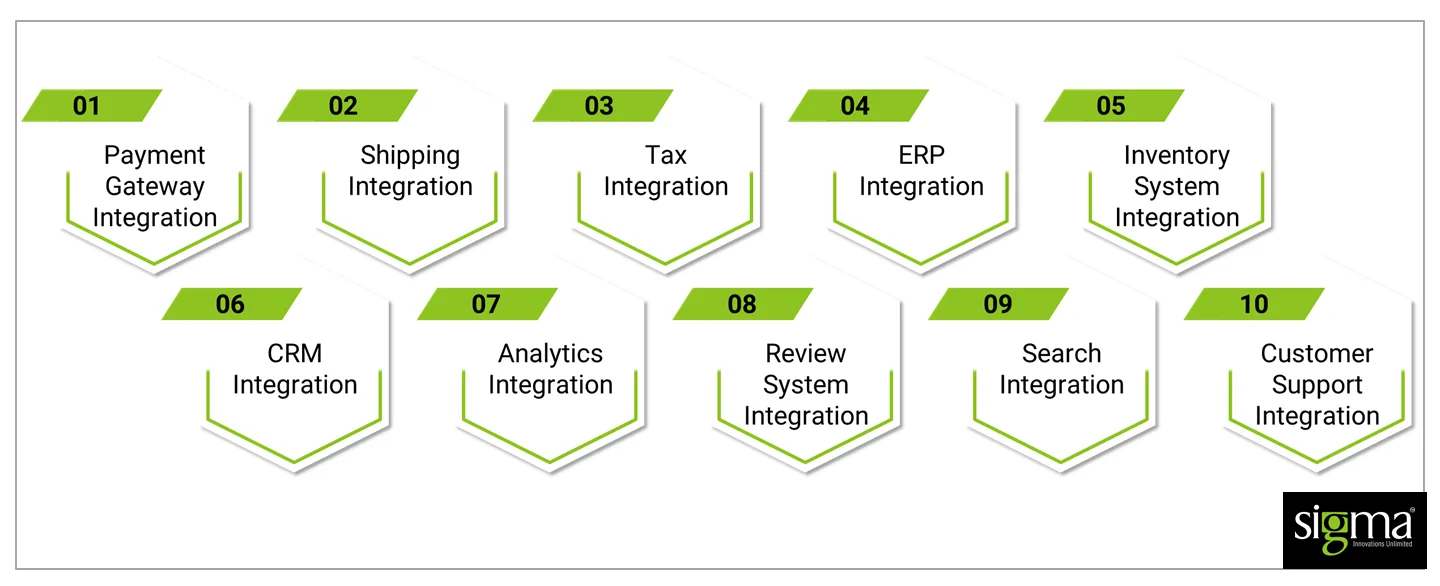eCommerce Third-Party Integrations: All You Need to Know
Third-party integrations are the way to connect external applications to our applications using APIs (Application Protocol Interfaces). When a new feature is needed to the system it is simpler, easier, and faster to add a tool that is already developed instead of building from scratch. For example, when you have an eCommerce website, if a chat is needed for customer support, instead of building a chat from scratch we can integrate an existing chat tool using APIs. It is simple and cost-effective.
Benefits of Integrating 3rd Party Systems to your Online Store
Businesses need to respond to market demands as early as possible. Third-Party Integration helps us to add new features and tools to our business process which will take more time to develop on your own. Below are the top 5 benefits of using 3rd Party Integrations for your online business:
Quick Implementation:
Third-party integration helps your business to save time as much as possible. Instead of developing the feature from scratch which takes a long time, integrations can be done as earlier as possible based on your evolving business needs.
Lower Cost
Development costs can be cut down and the same can be utilized for developing some unique features or can be invested to meet other business requirements. While we go with integrations, the initial investment will be less and it helps to plan and grow the business further successfully. The cost for these API integrations is mostly based on subscription-like monthly or yearly and some APIs will also cost according to usage.
Ease the Business Process and Provide the Best Features
We can add the best features to our eCommerce applications by using third-party integrations. Those features are already analyzed by experts. Integrating with eCommerce applications will help your business to reuse its knowledge and avoid unnecessary risks. Using third-party integrations, we can provide a good shopping experience and create trust in customers.
Sync Data from Multiple Systems
Always customers want to see the needed information easily. Syncing data from various sources to your applications will satisfy these needs. Like real-time inventory sync, connection to the warehouse, etc. Syncing data will also help to avoid redundant work of managing the data in all the applications. With this, you can reduce human errors and improve productivity.
Better Management
Integrating with multiple external applications like CRM, ERP, Inventory, Orders, and Accounting systems will help you to manage everything easily by saving a lot of time and manpower. This helps eCommerce businesses to improve their business efficiency.
3rd Party Integration Best Practices
When you are planning to integrate 3rd party applications into your eCommerce application you need to follow some industry best practices that are good for your application and business.
Plan Based on Your Business’s Needs
While you are planning to implement a 3rd party integration, first you need to prioritize and see how this integration is going to add value to your system. 3rd party integrations shouldn’t affect the core business model and benefits of the business. Integration which you look at should take your business to the next level.
Select Proper Applications & Competitor Analyzation
When you decide to integrate a particular feature into your eCommerce website, you need to research what all applications are available in the market to solve your business problem. Analyze all the applications and see which applications have more features and are forward-looking to solve your problems. We can also perform competitor analysis to check what all applications your competitors are using. Based on complete analysis, you can finalize the system/applications that need to be integrated with the website/application.
Go through API Documentation
After finalizing the application, you need to go through the API documentation thoroughly. This will help you to use the APIs properly in your application. Focus on the below items:
- Read the complete instructions on how to use the APIs
- How to send the data inputs
- Output details
- Usage restrictions
- Pricing details
- Validations and Response codes
Use Well Tested APIs
APIs have a high chance of downtime which leads to a bad user experience. Always use APIs from reputable sources. Spend as much time as possible on QA and load testing before deploying in production.
Pay Attention to Security
Focus on security features available in API, as some of API’s sources provide proper data protection and encrypted data while some 3rd party applications won’t provide proper security. Select a proper API that provides higher security to your data and user information. If needed, you need to implement some security measures from your end as well.
Use Scalable APIs
Your business can witness growth at any point in time. Scalable APIs will grow with your business. Using a scalable API will avoid redoing the entire integration again.
Backup Plan
Sometimes API providers may update their APIs and make some changes to existing APIs, so you need to have a backup plan for that to avoid downtime for your application. If possible identify similar APIs providers for the business needs as alternative options.
Understand Pricing Structure & Usage
Understand the pricing structure of APIs and their usage limit. This will help you to avoid unwanted expenses and downtime. Select the plans based on your usage needs.
10 Critical Third-Party Integrations for Your Online Store

Payment Gateway Integration
Nowadays all the online stores have payment gateways integrated into them. Which verifies the customer cards and is also convenient for the customer to use. The payment gateway can be integrated into multiple ways:
API hosted payment gateway
This is integrated directly into the eCommerce system’s own server. Customers can enter their card details and make the payment. Payment methods APIs will be used for this option. The great benefit of this option is easily customizable and provides a good shopping experience to your customers.
iFrame Integration
In this method, the payment gateway site is loaded in the iFrame. Where customers will feel they are on the same site where they can enter the details and make payment. Minimal customization may be available in this option.
Hosted Payment Gateways
In this method, users will be redirected to the payment provider site. Everything will be handled by payment service providers and the responses will be stored in eCommerce systems.
Some of the payment gateways available to integrate are:
- Adyen
- Amazon Pay
- Authorize.net
- BraintreeKlarna
- Paypal
- Stripe
- SagePaySquare
- Worldpay
Shipping Integration
Once an order is placed, then the order needs to be processed, packed, and shipped to the customer. If the store owner does this manually it takes a long time and money to complete this process. When we use shipping integration it helps to make things faster and provide various options to the customers and make them satisfied. When you integrate with shipping, it helps to get the orders from multiple channels and process all the orders faster.
There are various shipping methods like USPS, UPS, FedEx, etc. which can be integrated with online stores. There are some shipping aggregators, who bring multiple carriers into a single platform and provide quick access to shipping platforms. They also provide some competitive prices for the customers.
Some of the shipping aggregators are:
- ShipRocket
- Shippo
- Shippingeasy
- ECourierz
- IThink
- Pickrr
- Rocketbox
- ShipDroid
- ShipKaro
- ShipYaari
- Shyplite
- Silver Arrow
Tax Integration
Integrating tax APIs in eCommerce systems will help customers to calculate taxes for their purchases automatically. This reduces the work of store admins. Store admin needs to update the tax details relevant to all the locations. If there are any changes in tax percentage, you also need to redo everything. Integrating tax systems reduces the complete work of store admin as APIs get updated automatically.
Some of the Tax solution providers are:
- Avalara
- Taxjar
- Vertex
- Webgility
ERP Integration
Integrating eCommerce stores with ERP systems will help to manage customer details, product information, order details, and shipment details across the channels and will also help to manage the business in an efficient way.
Various ERPs which can be integrated into eCommerce systems are:
- NetSuite ERP
- SYSPRO
- Odoo
- SAP
- Sage Intacct
- EPICOR
- Microsoft Dynamics
Inventory System Integration
Inventory system integration will help to have real-time visibility of inventory in the eCommerce systems. While business is happening in multiple channels, maintaining inventory and updating each channel will create huge tasks. Integrating with inventory systems will avoid manual work and help to track everything in real-time.
Some of the Inventory management solutions are:
- NetsuiteERP
- ZohoInventory
- Unleashed
- Kladana
- Cin7
- Fishbowl
- Sage X3
CRM Integration
Integrating CRM into your eCommerce will help to sync all the customer details to the store automatically. This will help to build trust between your customers and the business. CRM integration will enable you to plan marketing strategies for your online stores by having customer data. This will also help your eCommerce business with better customer retention strategies.
Some of the CRM solution providers are:
- Marketo
- Salesforce
- Creatio
- Lucrativ
- ActiveCampaign
Analytics Integration
Integrating analytical tools will help to track the customer behavior and track all the customer metrics like customer sessions, bounce rates, etc. Analytics helps the business to improve customer satisfaction and provide customer needs. Google Analytics is now a standard tool that has been used by various businesses to track the customers in their stores. Google Analytics provides enormous reports which satisfy most of the business needs.
Review System Integration
Nowadays, customers are expecting to see the review of the products before they purchase. The review system integration will help the customer to rate and review the product they purchase and see the reviews for the products they want to purchase. Having a review system integrated across multiple channels will help the customers to compare the products and make a purchase decision. Having positive reviews will also boost sales and increase the rankings in search engines.
Some of the review tools are:
- Amazon Customer review
- G2 Review
- Trustpilot
- Hubspot
Search Integration
Search plays an important role in online stores. Customers are expecting to find their needs easily. Integrating search engines will make this job easier and will help businesses to track customers’ needs and boost their products based on keywords, misspelled words, etc. Having search engines like Klevu, InstaSearch, and Elasticsearch integrated into the stores will help the business to have various algorithms setup to deliver a better customer experience.
Some of the search solutions are:
- Klevu
- Algolia
- Unbxd
- Instantsearch
- Searchnise
Customer Support Tools Integration
Customer support plays an important role in the eCommerce business. Our system always should be in readiness to provide support for customers whenever required. Integrating LiveChat and Helpdesk tools into eCommerce systems will help to provide proper support to customers and make the customer engaged with your eCommerce stores. Having live chat integrated will make the customers contact immediately.
Some of the customer support tools are:
- Livechat
- Gorgias
- Hubspot LiveChat
- Freshchat
- Zohodesk
- Helpdesk
Conclusion
Integrating various third-party systems into an eCommerce system nowadays is essential to get success in the eCommerce industry. The investment made for integrating third-party systems to eCommerce provides various benefits. They reduce a lot of manual work, make the store admin & business owner’s job easier, and provide a better customer experience.
Sigma Infosolutions helps various customers across the world in developing and integrating eCommerce sites with various third-party integrations. We are also partnering with various solution providers to help our customers. Click to view our Partners and our Case Study.
